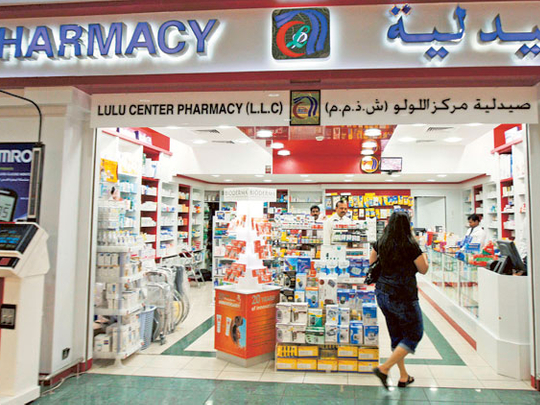
Dubai: The “Made in the UAE” label is starting to stick in the global pharmaceutical industry. And this time it is the turn of one of the drug giants — €10.3-billion (Dh49.8 billion) Merck of Germany — which is helping with putting the label on.
Beginning in the fourth quarter, local production of Merck’s hormone therapy drug, Euthyrox, will start, closely followed early next year by the first release of the popular diabetes drug, Glucophage. Both will be made at the plant operated by UAE-headquartered Neopharma in Abu Dhabi through a licensing arrangement with Merck Serono.
This will be just the impetus that the local pharmaceutical marketplace — which has long relied on imports for its drug requirements and locally produced primarily generic drugs until now — needed.
With global pharma majors now willing to try local production of their branded drugs, the immediate upshot is the depth it gives the market here, currently valued at $1.4 billion.
According to Merck Serono, the immediate beneficiary from local production will be those who need the medicines.
“Currently there is a six-month timeline for our medication to reach patients from the time it is ready for export,” said Paolo Carli, Merck Serono’s head for the Middle Near East, Saudi Arabia and Egypt. “With local manufacturing, we will be able to shorten this timeline to two months.
“With the Middle East having some of the highest prevalence rates for lifestyle diseases, a long delivery schedule can create a bottleneck as more and more medication is needed to meet growing needs.”
Prices
Effective from June, prices of more than 6,000 OTC drugs sold in the country would be revised, with many of these becoming cheaper by as much as 40 per cent. The move, initiated by the Ministry of Health, is far-reaching and has been done to rationalise the effect currency fluctuations have had on imported drugs. This would make sure that the differential in retail prices that dugs sold in the UAE had vis-a-vis Saudi Arabia or Qatar has narrowed substantially.
According to a recent report by Alpen Capital, the fact that the GCC imports 90 per cent of its drug requirements has been one factor in health care inflation costs.
But Merck Serono officials insist having local production is not about what the drugs would cost at the retail level compared to the imports.
“The Middle East is a brand-oriented market and Glucophage a well-accepted brand, so it was important we localise this here in the Middle East,” said Belen Garijo, chief operating officer at Merck Serono.
“Our priority is to expand our manufacturing network in emerging markets like the Middle East. We aim to remain an agile company so we can maximise opportunities.”
Regulation
The local production of the Merck Serono drugs will also have regional coverage. “Regulations in the region permit only one country of origin for a particular drug… so basically we are looking at sole supply for the Middle East from the UAE,” said Garijo.
“For biologics (which are genetically engineered proteins) we will still have worldwide locations because their localisation is much more complex and a completely different matter.”
Asked if now that Merck Serono has got a taste of local production, the scope will be widened beyond the two drugs, Garijo said: “It is a starting point and as our growth accelerates, we will have to be able to respond effectively to the demand that we are creating. This is why local manufacturing is at the centre on our strategy.”











